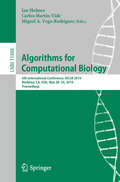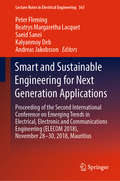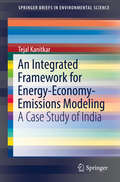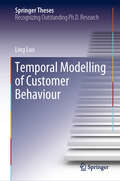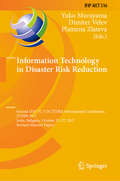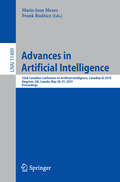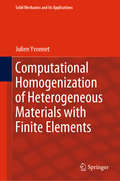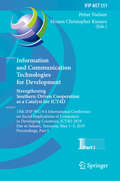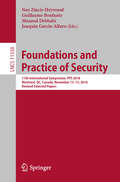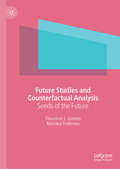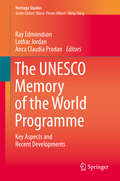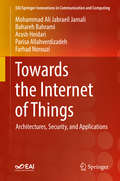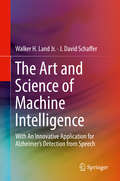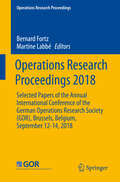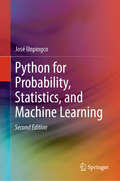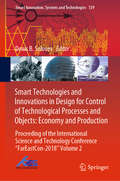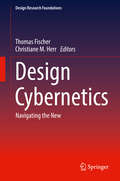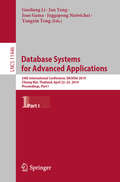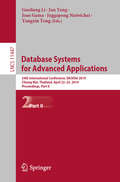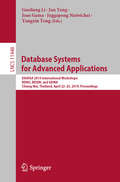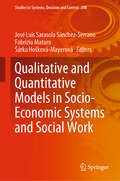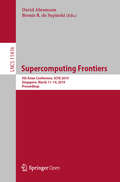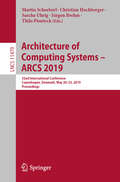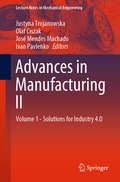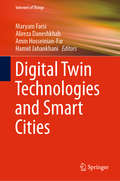- Table View
- List View
Algorithms for Computational Biology: 6th International Conference, AlCoB 2019, Berkeley, CA, USA, May 28–30, 2019, Proceedings (Lecture Notes in Computer Science #11488)
by Ian Holmes Carlos Martín-Vide Miguel A. Vega-RodríguezThis book constitutes the proceedings of the 6th InternationalConference on Algorithms for Computational Biology, AlCoB 2019, held in Berkeley, CA, USA, in May 2019. The 15 full papers presented together with 1 invited paper were carefully reviewed and selected from 30 submissions. They are organized in the following topical sections: Biological networks and graph algorithms; genome rearrangement, assembly and classification; sequence analysis, phylogenetics and other biological processes.
Smart and Sustainable Engineering for Next Generation Applications: Proceeding of the Second International Conference on Emerging Trends in Electrical, Electronic and Communications Engineering (ELECOM 2018), November 28–30, 2018, Mauritius (Lecture Notes in Electrical Engineering #561)
by Peter Fleming Beatrys Margaretha Lacquet Saeid Sanei Kalyanmoy Deb Andreas JakobssonThis book reports on advanced theories and methods in two related engineering fields: electrical and electronic engineering, and communications engineering and computing. It highlights areas of global and growing importance, such as renewable energy, power systems, mobile communications, security and the Internet of Things (IoT). The contributions cover a number of current research issues, including smart grids, photovoltaic systems, wireless power transfer, signal processing, 4G and 5G technologies, IoT applications, mobile cloud computing and many more. Based on the proceedings of the Second International Conference on Emerging Trends in Electrical, Electronic and Communications Engineering (ELECOM 2018), held in Mauritius from November 28 to 30, 2018, the book provides graduate students, researchers and professionals with a snapshot of the state-of-the-art and a source of new ideas for future research and collaborations.
An Integrated Framework for Energy-Economy-Emissions Modeling: A Case Study of India (SpringerBriefs in Environmental Science)
by Tejal KanitkarThis book combines three different energy-economy-emissions modeling methodologies into one Integrated Modeling Framework (IMF) in an attempt to fill gaps in current modeling research as it applies to developing countries. Through the analysis of existing mathematical models, including large macro-economic models and technology-explicit energy models, the work proposes planning methodologies for developing countries that face challenges on their economy and infrastructure due to climate change. The three modeling methodologies discussed in the chapters are a decomposition analysis of trends in emissions intensity of GDP, linear programming techniques to determine optimum energy supply pathways given various resource and emissions constraints, and an input-output analysis to evaluate the impact of energy policies on income and equity. After a brief introduction to the history of the development of energy studies and the linkages between energy, economic, and environmental systems, the book delves into the component methodologies of the IMF and their intended outcomes. The decomposition analysis is intended to gauge the energy intensity of GDP and the structural composition of the economy to provide a basis on which scenarios are constructed in the following two methodologies. The linear programs are meant to develop a methodology to determine energy options under a variety of scenarios that capture the technical and economic characteristics of the power sector of developing countries. Lastly, the input-output analysis aims to build a methodology through which energy policy decisions can be understood and quantified to ensure the best possible impacts on developing economies and societies. Those who will be interested in this book include policy makers, academics, and students and professionals working on energy studies and energy-economy modeling.
Temporal Modelling of Customer Behaviour (Springer Theses)
by Ling LuoThis book describes advanced machine learning models – such as temporal collaborative filtering, stochastic models and Bayesian nonparametrics – for analysing customer behaviour. It shows how they are used to track changes in customer behaviour, monitor the evolution of customer groups, and detect various factors, such as seasonal effects and preference drifts, that may influence customers’ purchasing behaviour. In addition, the book presents four case studies conducted with data from a supermarket health program in which the customers were segmented and the impact of promotional activities on different segments was evaluated. The outcomes confirm that the models developed here can be used to effectively analyse dynamic behaviour and increase customer engagement. Importantly, the methods introduced here can also be used to analyse other types of behavioural data such as activities on social networks, and educational systems.
Information Technology in Disaster Risk Reduction: First Ifip Tc 5 Dcdrr International Conference, Itdrr 2016, Sofia, Bulgaria, November 16-18,, 2016, Revised Selected Papers (IFIP Advances in Information and Communication Technology #501)
by Yuko Murayama Dimiter Velev Plamena ZlatevaThis volume constitutes the refereed post-conference proceedings of the Second IFIP TC 5 DCITDRR International Conference on Information Technology in Disaster Risk Reduction, ITDRR 2017, held in Sofia, Bulgaria, in October 2017. <P><P> The 16 revised full papers presented were carefully reviewed and selected from 43 submissions. The papers focus on various aspects and challenges of coping with disaster risk reduction. The main topics include areas such as natural disasters, big data, cloud computing, Internet of Things, mobile computing, emergency management, disaster information processing, and disaster risk assessment and management.
Advances in Artificial Intelligence: 32nd Canadian Conference on Artificial Intelligence, Canadian AI 2019, Kingston, ON, Canada, May 28–31, 2019, Proceedings (Lecture Notes in Computer Science #11489)
by Marie-Jean Meurs Frank RudziczThis book constitutes the refereed proceedings of the 32nd Canadian Conference on Artificial Intelligence, Canadian AI 2019, held in Kingston, ON, Canada, in May 2019.The 27 regular papers and 34 short papers presented together with 8 Graduate Student Symposium papers and 4 Industry Track papers were carefully reviewed and selected from 132 submissions. The focus of the conference was on artificial intelligence research and advanced information and communications technology.
Computational Homogenization of Heterogeneous Materials with Finite Elements (Solid Mechanics and Its Applications #258)
by Julien YvonnetThis monograph provides a concise overview of the main theoretical and numerical tools to solve homogenization problems in solids with finite elements. Starting from simple cases (linear thermal case) the problems are progressively complexified to finish with nonlinear problems. The book is not an overview of current research in that field, but a course book, and summarizes established knowledge in this area such that students or researchers who would like to start working on this subject will acquire the basics without any preliminary knowledge about homogenization. More specifically, the book is written with the objective of practical implementation of the methodologies in simple programs such as Matlab. The presentation is kept at a level where no deep mathematics are required.
Information and Communication Technologies for Development. Strengthening Southern-Driven Cooperation as a Catalyst for ICT4D: 15th IFIP WG 9.4 International Conference on Social Implications of Computers in Developing Countries, ICT4D 2019, Dar es Salaam, Tanzania, May 1–3, 2019, Proceedings, Part I (IFIP Advances in Information and Communication Technology #551)
by Petter Nielsen Honest Christopher KimaroThe two volumes IFIP AICT 551 and 552 constitute the refereed proceedings of the 15th IFIP WG 9.4 International Conference on Social Implications of Computers in Developing Countries, ICT4D 2019, held in Dar es Salaam, Tanzania, in May 2019.The 97 revised full papers and 2 short papers presented were carefully reviewed and selected from 185 submissions. The papers present a wide range of perspectives and disciplines including (but not limited to) public administration, entrepreneurship, business administration, information technology for development, information management systems, organization studies, philosophy, and management. They are organized in the following topical sections: communities, ICT-enabled networks, and development; digital platforms for development; ICT for displaced population and refugees. How it helps? How it hurts?; ICT4D for the indigenous, by the indigenous and of the indigenous; local technical papers; pushing the boundaries - new research methods, theory and philosophy in ICT4D; southern-driven human-computer interaction; sustainable ICT, informatics, education and learning in a turbulent world - "doing the safari way”.
Foundations and Practice of Security: 11th International Symposium, FPS 2018, Montreal, QC, Canada, November 13–15, 2018, Revised Selected Papers (Lecture Notes in Computer Science #11358)
by Nur Zincir-Heywood Guillaume Bonfante Mourad Debbabi Joaquin Garcia-AlfaroThis book constitutes the revised selected papers of the 11th International Symposium on Foundations and Practice of Security, FPS 2018, held in Montreal, QC, Canada, in March 2018. The 16 full papers, 1 short paper, 1 position paper and 2 invited papers presented in this book, were carefully reviewed and selected from 51 submissions. They cover a range of topics including mobile security; cloud security and big data; IoT security; software security, malware analysis, and vulnerability detection; cryptography; cyber physical security and hardware security; and access control.
Future Studies and Counterfactual Analysis: Seeds of the Future
by Theodore J. Gordon Mariana TodorovaIn this volume, the authors contribute to futures research by placing the counterfactual question in the future tense. They explore the possible outcomes of future, and consider how future decisions are turning points that may produce different global outcomes. This book focuses on a dozen or so intractable issues that span politics, religion, and technology, each addressed in individual chapters. Until now, most scenarios written by futurists have been built on cause and effect narratives or depended on numerical models derived from historical relationships. In contrast, many of the scenarios written for this book are point descriptions of future discontinuities, a form allows more thought-provoking presentations. Ultimately, this book demonstrates that counterfactual thinking and point scenarios of discontinuities are new, groundbreaking tools for futurists.
The UNESCO Memory of the World Programme: Key Aspects and Recent Developments (Heritage Studies)
by Ray Edmondson Lothar Jordan Anca Claudia ProdanThe volume “The UNESCO Memory of the World Programme: Key Aspects and Recent Developments” responds to the growing interest in the scientific study of the Memory of the World Programme (MoW) and its core concept of documentary heritage, which has received little attention from scholarship so far. This sixth publication in the Heritage Studies Series provides a first collection of differing approaches (including reflected reports, essays, research contributions, and theoretical reflections) for the study of the MoW Programme, offering a basis for follow-up activities. The volume, edited by Ray Edmondson, Lothar Jordan and Anca Claudia Prodan, brings together 21 scholars from around the globe to present aspects deemed crucial for understanding MoW, its development, relevance and potential. The aim is to encourage academic research on MoW and to enhance the understanding of its potential and place within Heritage Studies and beyond.
Towards the Internet of Things: Architectures, Security, and Applications (EAI/Springer Innovations in Communication and Computing)
by Mohammad Ali Jabraeil Jamali Bahareh Bahrami Arash Heidari Parisa Allahverdizadeh Farhad NorouziThis book presents a comprehensive framework for IoT, including its architectures, security, privacy, network communications, and protocols. The book starts by providing an overview of the aforementioned research topics, future directions and open challenges that face the IoT development. The authors then discuss the main architectures in the field, which include Three- and Five-Layer Architectures, Cloud and Fog Based Architectures, a Social IoT Application Architecture. In the security chapter, the authors outline threats and attacks, privacy preservation, trust and authentication, IoT data security, and social awareness. The final chapter presents case studies including smart home, wearables, connected cars, industrial Internet, smart cities, IoT in agriculture, smart retail, energy engagement, IoT in healthcare, and IoT in poultry and farming.Discusses ongoing research into the connection of the physical and virtual worlds;Includes the architecture, security, privacy, communications, and protocols of IoT;Presents a variety of case studies in IoT including wearables, smart cities, and energy management.
The Art and Science of Machine Intelligence: With An Innovative Application for Alzheimer’s Detection from Speech
by J. David Schaffer Walker H. Land Jr.This volume presents several machine intelligence technologies, developed over recent decades, and illustrates how they can be combined in application. One application, the detection of dementia from patterns in speech, is used throughout to illustrate these combinations. This application is a classic stationary pattern detection task, so readers may easily see how these combinations can be applied to other similar tasks. The expositions of the methods are supported by the basic theory they rest upon, and their application is clearly illustrated. The book’s goal is to allow readers to select one or more of these methods to quickly apply to their own tasks.Includes a variety of machine intelligent technologies and illustrates how they can work togetherShows evolutionary feature subset selection combined with support vector machines and multiple classifiers combinedIncludes a running case study on intelligent processing relating to Alzheimer’s / dementia detection, in addition to several applications of the machine hybrid algorithms
Operations Research Proceedings 2018: Selected Papers of the Annual International Conference of the German Operations Research Society (GOR), Brussels, Belgium, September 12-14, 2018 (Operations Research Proceedings)
by Bernard Fortz Martine LabbéThis book gathers a selection of peer-reviewed papers presented at the International Conference on Operations Research (OR 2018), which was held at the Free University of Brussels, Belgium on September 12 - 14, 2018, and was jointly organized by the German Operations Research Society (GOR) and the Belgian Operational Research Society (ORBEL). 575 scientists, practitioners and students from mathematics, computer science, business/economics and related fields attended the conference and presented more than 400 papers in parallel topic streams, as well as special award sessions.The respective papers discuss classical mathematical optimization, statistics and simulation techniques. These are complemented by computer science methods, and by tools for processing data, designing and implementing information systems. The book also examines recent advances in information technology, which allow big data volumes to be processed and enable real-time predictive and prescriptive business analytics to drive decisions and actions. Lastly, it includes problems modeled and treated while taking into account uncertainty, risk management, behavioral issues, etc.
Python for Probability, Statistics, and Machine Learning
by José UnpingcoThis textbook, fully updated to feature Python version 3.7, covers the key ideas that link probability, statistics, and machine learning illustrated using Python modules. The entire text, including all the figures and numerical results, is reproducible using the Python codes and their associated Jupyter/IPython notebooks, which are provided as supplementary downloads. The author develops key intuitions in machine learning by working meaningful examples using multiple analytical methods and Python codes, thereby connecting theoretical concepts to concrete implementations. The update features full coverage of Web-based scientific visualization with Bokeh Jupyter Hub; Fisher Exact, Cohen’s D and Rank-Sum Tests; Local Regression, Spline, and Additive Methods; and Survival Analysis, Stochastic Gradient Trees, and Neural Networks and Deep Learning. Modern Python modules like Pandas, Sympy, and Scikit-learn are applied to simulate and visualize important machine learning concepts like the bias/variance trade-off, cross-validation, and regularization. Many abstract mathematical ideas, such as convergence in probability theory, are developed and illustrated with numerical examples. This book is suitable for classes in probability, statistics, or machine learning and requires only rudimentary knowledge of Python programming.
Smart Technologies and Innovations in Design for Control of Technological Processes and Objects: Proceeding of the International Science and Technology Conference "FarEastСon-2018" Volume 2 (Smart Innovation, Systems and Technologies #139)
by Denis B. SolovevThis book features selected papers presented at The International Science and Technology Conference “FarEastCon”, which took place on October 2–4, 2018 in Vladivostok, Russian Federation.The conference represents an informational platform for accumulating expert opinion on projects and initiatives aimed at the implementation of farsighted scientific research and development; it also allows scientific and practical achievements to be shared with a wide circle of researchers.Sections of the conference are of interest for the broad range of experts involved in developing innovative solutions and organizing events that increase the efficiency of economic and innovative activities.
Design Cybernetics: Navigating the New (Design Research Foundations)
by Thomas Fischer Christiane M. HerrDesign Cybernetics: Navigating the New Design cybernetics offers a way of looking at ourselves – curious, creative, and ethical humans – as self-organising systems that negotiate their own goals in open-ended explorations of the previously unknown. It is a theory of and for epistemic practices (learning, designing, researching) that is deeply committed to the autonomy of others and hence offers no prescriptive methodology. Design cybernetics describes design practice as inextricable from conversation – a way of enquiring, developing shared understanding and reaching the new that harnesses reliable control as well as error and serendipity. Recognising circular causality, observer-dependency and non-determinability, design cybernetics extends beyond tenets of scientific research into the creative, ethical and aesthetic domain. From this perspective, design is not an ill-conceived subset of scientific research. Instead, scientific research emerges as a particularly restricted subset of the broader human activity of design. This volume offers a cross-section of design cybernetic theory and practice with contributions ranging across architecture, interior lighting studies, product design, embedded systems, design pedagogy, design theory, social transformation design, research epistemology, art and poetics, as well as theatre and acting. Addressing designers, design educators and researchers interested in a rigorous, practice-based epistemology, it establishes design cybernetics as a foundational perspective of design research. “This is a conceptually elegant, well structured, and comprehensive presentation of design cybernetics. It fills a gap in the literature of the field.” Ken Friedman, Chair Professor, Tongji University “This book offers a valuable and timely introduction to second-order cybernetics as society grapples with complex issues like climate change and rising inequality.” Joichi Ito, Director of the MIT Media Lab
Database Systems for Advanced Applications: 24th International Conference, DASFAA 2019, Chiang Mai, Thailand, April 22–25, 2019, Proceedings, Part I (Lecture Notes in Computer Science #11446)
by Guoliang Li Jun Yang Joao Gama Juggapong Natwichai Yongxin TongThis two-volume set LNCS 11446 and LNCS 11447 constitutes the refereed proceedings of the 24th International Conference on Database Systems for Advanced Applications, DASFAA 2019, held in Chiang Mai, Thailand, in April 2019. The 92 full papers and 64 short papers were carefully selected from a total of 501 submissions. In addition, 13 demo papers and 6 tutorial papers are included. The full papers are organized in the following topics: big data; clustering and classification; crowdsourcing; data integration; embedding; graphs; knowledge graph; machine learning; privacy and graph; recommendation; social network; spatial; and spatio-temporal. The short papers, demo papers, and tutorial papers can be found in the volume LNCS 11448, which also includes the workshops of DASFAA 2019.
Database Systems for Advanced Applications: 24th International Conference, DASFAA 2019, Chiang Mai, Thailand, April 22–25, 2019, Proceedings, Part II (Lecture Notes in Computer Science #11447)
by Guoliang Li Jun Yang Joao Gama Juggapong Natwichai Yongxin TongThis two-volume set LNCS 11446 and LNCS 11447 constitutes the refereed proceedings of the 24th International Conference on Database Systems for Advanced Applications, DASFAA 2019, held in Chiang Mai, Thailand, in April 2019. The 92 full papers and 64 short papers were carefully selected from a total of 501 submissions. In addition, 13 demo papers and 6 tutorial papers are included. The full papers are organized in the following topics: big data; clustering and classification; crowdsourcing; data integration; embedding; graphs; knowledge graph; machine learning; privacy and graph; recommendation; social network; spatial; and spatio-temporal. The short papers, demo papers, and tutorial papers can be found in the volume LNCS 11448, which also includes the workshops of DASFAA 2019.
Database Systems for Advanced Applications: DASFAA 2019 International Workshops: BDMS, BDQM, and GDMA, Chiang Mai, Thailand, April 22–25, 2019, Proceedings (Lecture Notes in Computer Science #11448)
by Guoliang Li Jun Yang Joao Gama Juggapong Natwichai Yongxin TongThis book constitutes the workshop proceedings of the 24th International Conference on Database Systems for Advanced Applications, DASFAA 2019, held in Chiang Mai, Thailand, in April 2019. The 14 full papers presented were carefully selected and reviewed from 26 submissions to the three following workshops: the 6th International Workshop on Big Data Management and Service, BDMS 2019; the 4th International Workshop on Big Data Quality Management, BDQM 2019; and the Third International Workshop on Graph Data Management and Analysis, GDMA 2019. This volume also includes the short papers, demo papers, and tutorial papers of the main conference DASFAA 2019.
Qualitative and Quantitative Models in Socio-Economic Systems and Social Work (Studies in Systems, Decision and Control #208)
by José Luis Sarasola Sánchez-Serrano Fabrizio Maturo Šárka Hošková-MayerováThe main purpose of this book is not only to present recent studies and advances in the field of social science research, but also to stimulate discussion on related practical issues concerning statistics, mathematics, and economics. Accordingly, a broad range of tools and techniques that can be used to solve problems on these topics are presented in detail in this book, which offers an ideal reference work for all researchers interested in effective quantitative and qualitative tools. The content is divided into three major sections. The first, which is titled “Social work”, collects papers on problems related to the social sciences, e.g. social cohesion, health, and digital technologies. Papers in the second part, “Education and teaching issues,” address qualitative aspects, education, learning, violence, diversity, disability, and ageing, while the book’s final part, “Recent trends in qualitative and quantitative models for socio-economic systems and social work”, features contributions on both qualitative and quantitative issues. The book is based on a scientific collaboration, in the social sciences, mathematics, statistics, and economics, among experts from the “Pablo de Olavide” University of Seville (Spain), the “University of Defence” of Brno (Czech Republic), the “G. D’Annunzio” University of Chieti-Pescara (Italy) and “Alexandru Ioan Cuza University” of Iaşi (Romania). The contributions, which have been selected using a peer-review process, examine a wide variety of topics related to the social sciences in general, while also highlighting new and intriguing empirical research conducted in various countries. Given its scope, the book will appeal, in equal measure, to sociologists, mathematicians, statisticians and philosophers, and more generally to scholars and specialists in related fields.
Supercomputing Frontiers: 5th Asian Conference, SCFA 2019, Singapore, March 11–14, 2019, Proceedings (Lecture Notes in Computer Science #11416)
by David Abramson Bronis R. de SupinskiThis open access book constitutes the refereed proceedings of the 5th Asian Supercomputing Conference, SCFA 2019, held in Singapore in March 2019. The 6 full papers presented in this book were carefully reviewed and selected from 33 submissions. They cover a range of topics including memory fault handling, linear algebra, image processing, heterogeneous computing, resource usage prediction, and data caching.
Architecture of Computing Systems – ARCS 2019: 32nd International Conference, Copenhagen, Denmark, May 20–23, 2019, Proceedings (Lecture Notes in Computer Science #11479)
by Martin Schoeberl Christian Hochberger Sascha Uhrig Jürgen Brehm Thilo PionteckThis book constitutes the proceedings of the 32nd International Conference on Architecture of Computing Systems, ARCS 2019, held in Copenhagen, Denmark, in May 2019. The 24 full papers presented in this volume were carefully reviewed and selected from 40 submissions. ARCS has always been a conference attracting leading-edge research outcomes in Computer Architecture and Operating Systems, including a wide spectrum of topics ranging from embedded and real-time systems all the way to large-scale and parallel systems. The selected papers are organized in the following topical sections: Dependable systems; real-time systems; special applications; architecture; memory hierarchy; FPGA; energy awareness; NoC/SoC. The chapter 'MEMPower: Data-Aware GPU Memory Power Model' is open access under a CC BY 4.0 license at link.springer.com.
Advances in Manufacturing II: Volume 1 - Solutions for Industry 4.0 (Lecture Notes in Mechanical Engineering)
by Justyna Trojanowska Olaf Ciszak José Mendes Machado Ivan PavlenkoThis book covers a variety of topics related to the Industry 4.0 concept, with a special emphasis on the efficiency of production processes and innovative solutions for smart factories. It describes tools supporting this concept in both the mechanical engineering and biomedical engineering field. The content is based on papers presented at the 6th International Scientific-Technical Conference MANUFACTURING 2019, held on 19-22 May 2019, in Poznan, Poland. Virtual reality, simulation of manufacturing systems, additive manufacturing, big data analysis, automation and application of artificial intelligence, as well as economic and social issues related to the integration of those technologies are just some of the topics discussed here. All in all, the book offers a timely and practice-oriented reference guide for researchers and practitioners, and is expected to foster better communication and closer cooperation between universities and their business and industrial partners.
Digital Twin Technologies and Smart Cities (Internet of Things)
by Maryam Farsi Alireza Daneshkhah Amin Hosseinian-Far Hamid JahankhaniThis book provides a holistic perspective on Digital Twin (DT) technologies, and presents cutting-edge research in the field. It assesses the opportunities that DT can offer for smart cities, and covers the requirements for ensuring secure, safe and sustainable smart cities. Further, the book demonstrates that DT and its benefits with regard to: data visualisation, real-time data analytics, and learning leading to improved confidence in decision making;reasoning, monitoring and warning to support accurate diagnostics and prognostics;acting using edge control and what-if analysis; andconnection with back-end business applications hold significant potential for applications in smart cities, by employing a wide range of sensory and data-acquisition systems in various parts of the urban infrastructure. The contributing authors reveal how and why DT technologies that are used for monitoring, visualising, diagnosing and predicting in real-time are vital to cities’ sustainability and efficiency. The concepts outlined in the book represents a city together with all of its infrastructure elements, which communicate with each other in a complex manner. Moreover, securing Internet of Things (IoT) which is one of the key enablers of DT’s is discussed in details and from various perspectives. The book offers an outstanding reference guide for practitioners and researchers in manufacturing, operations research and communications, who are considering digitising some of their assets and related services. It is also a valuable asset for graduate students and academics who are looking to identify research gaps and develop their own proposals for further research.
